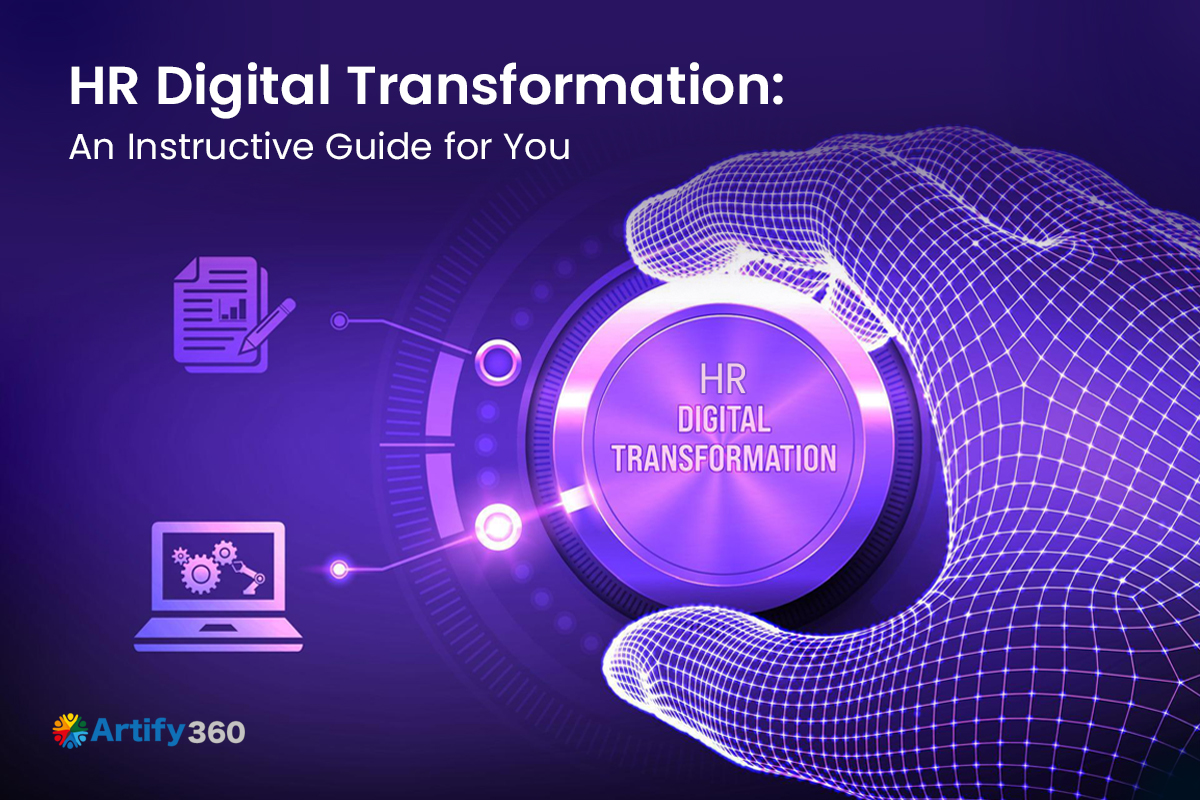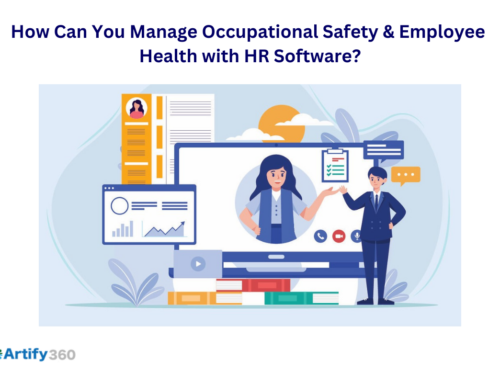When it comes to technology development practices and adaptive innovations, digital transformation plays a crucial role. It is highly relevant from an organizational perspective. The value of digital transformation applies to all sectors of a business model. The application of HR management solutions and services is one such feature.
Digital transformation can cause highly important changes in HR activities and their implementation in an organization’s operations model. It is a consistently rising domain with active participation from the various wings of the organization. The resulting objective of executing digital transformation in the HR niche should be the quality delivery of an empowering and automated operations process.
This article takes a look at the unique prospects of HR digital transformation techniques and strategies. It covers different stages of an organization’s digital transformation model. You can learn more about the benefits, challenges, and proven tips related to digital transformation implementation in organizations.
Hop in to discover the successful navigation tactics used by digital transformation in HR and how you can successfully implement them using a dedicated software platform. An important factor that governs the process is the constant updation and inflow of digitization elements in the business model.
What is HR Digital Transformation?
The principles and policies that apply to general digital transformation are useful for the HR domain activities as well. The concept of HR digital transformation represents the process of digitization and automation of existing operational activities. It helps you to promote an active HRMS system or model with sufficient scope for optimizing the entire process.
When you execute the channels of digital transformation at optimum levels, the next step is to empower your core HR process to boost the fundamental functions. They include operations management, performance efficiency, and HR productivity of the organization. Data-driven HR processes and powered employee experiences are part of this unique digitization model.
If you are thinking about the transformation of traditional and physical or manual HR processes to an automated level, you are correct. However, an organization’s HR transformation covers much more than that. It helps you to adopt an engaging and effective model that houses smart and intelligent HR measures like AI tools.
When you accept and embrace the functions of HR automation amid your operations’ goals, it might bring about broader changes to the entire organizational structure. The suitable choice in this regard is to adopt an essential HR automation and digitization function. It is pointless to shy away from the possibility of digital transformation in your firm, considering that the global market worth of the company is nearly $900 billion.
The possible setup to make your digital transformation process successful in an HR context is the step-by-step adaptation of the automation process. If you can work with a dedicated and proven HRMS platform with a progressive path, the core process will be easier for you.
Stages of Digital Transformation in An Organization’s HR Model
When you decide to promote an active and integrated digital transformation model for the company’s HR process, it should be deployed in different stages. Take a look at the top stages of digital transformation implementation below:
Traditional HR process flow
The first step is to proceed with the organizational operations and functions with a traditional HR workflow process.
Vision for HR technology roadmap
Meanwhile, you have a frame and create a fresher and innovative roadmap to activate digital HR operations practices at an optimum level.
Creation and experimentation with digital transformation
Once you finalize the HR vision, implement the new operations version to the existing processes with digital transformation principles and techniques.
The formal meeting of the Agile needs
Digital processes should be introduced to the operations model with the core support of agile methodologies to promote an exclusive automation model in HR.
Digital strategy collaboration
The next step is the active collaboration of traditional operations methods and new digital workforce strategies to receive value in the HR domain to boost business functions.
Convergence phase
It covers the merging of all the HR features to a stage where complete digitization takes over the operations category of the business model.
Innovation and adaptability stage
The final phase of effective digital transformation is the integration of the latest innovative practices in the HR niche to help your business adapt to the core market needs.
Benefits of HR Digital Transformation
The promising merits of a successful digital transformation model for your HR division are numerous. Check out the list below to understand the top-notch benefits of the concept from an organizational perspective.
Better operations performance
With the introduction of various digital systems and solutions, it is easier to boost the overall operational efficiency and performance of your organization.
Easier access to HR management
Your HR department should be kept tidy in all its operational tasks and activities. It offers you easier access and control of the entire organization’s HR management division with ease.
Improved employee engagement
When you have enhanced employee productivity or an engagement model to support your resources, it will uplift the entire organization. Digitization techniques guarantee this benefit.
Exploration of online possibilities
The beneficial advantage of embracing automation tactics is that your organization can grow perfectly when it comes to the adoption of several online possibilities regarding a firm’s growth.
Employer branding boost
The rising need for solid employer branding potential is important when you connect well with the new-age market and human capital resources. Digital transformation can help you with some priceless prospects in this case.
Efficient & productive HRMS domain
While interacting with the digitization techniques, it is easier to form an engaging HRMS platform in your organization, capable of improving HR efficiency and business productivity.
Data-based decision-making
The decision-making process of an organization reaches its peak value when you go with data-based insights and actionable information. It is the factor of automation that adds value to your business needs related to effective data management.
Streamlined workflow
The complete workflow in an organization’s business and HR domain can attain a streamlined objective with the right selection and integration of digital transformation tools and platforms.
Challenges in HR Digital Transformation
The promising scenario of digital transformation in HR is not without its fair share of challenges. You should have clarity regarding these potential challenges to tackle and overcome those factors effectively. Here’s the list:
Resistance to change
When you are trying to implement core digital transformation techniques in an organizational context, the biggest challenge is the resistance to accept and embrace change to the business model.
Lack of clear objectives
You should have a clear understanding of the top objectives of an empowering digital HR process. It becomes a problem when you lack knowledge about the same.
Lack of knowledge and skills
To apply your effective skills and information in a digital setting, the know-how should be present from the initial stages. Otherwise, it could be an issue.
Misuse of digital tools
When you introduce an influx of digital tools and technologies, it will be harder to use the various innovative solutions with appropriate practices from the initial phase. The learning curve takes time to understand and execute.
Insufficient resource management
If you cannot handle your resources well within an organization, it could lead to disastrous results in the long run for the business model.
Unpredictable outcome
When you embrace newer technologies and fresher innovative practices, the results may be uncertain from an organizational perspective. Staying on top of this challenge is an important task.
Compliance-related issues
The concept of compliance management is genuinely important in an organization, irrespective of its size, type, and serving market. The active norms and regulatory measures should be followed to promote compliance management during the switch to a digital phase.
Strategies & Tips to Embrace Digital Transformation in Your HR Domain
The ideal involvement of digital transformation in an organization should be made for the longer term. Given below are some of the strategies and exclusive tips that you can adopt to create an effective digital transformation model:
- The primary strategy to deliver a successful digital transformation model is active support offered by the consistent evaluation of HR processes.
- When you try and develop a new HR management strategy with digitization goals, it is important to promote well-defined objectives. Crafting such details in advance will help the resources prepare for the upcoming HR changes using key operations measurement parameters.
- Digital transformation should be applied to each aspect of HR operations management in your organization. Later, you can use it to perform automation for the entire HR segments of the organization.
- If you are planning to assess the ongoing digital transformation in the HR operations division, get your priorities right first. It can help you redefine and optimize the core HR objectives with ease.
- Include all your employees in the digital transformation processes. Their participation makes the entire process a wholesome experience for the company’s HR operations and business management segments.
- Opt for streamlined HR integration while collaborating with the digital transformation prospects of your organization. Ensure that the particular model is tailored to meet the vision of your organization’s market, niche, and industry.
- AI in HR is gaining momentum rapidly. According to business studies, 58% of the leaders use them to improve the consistency and quality of the HR operations.
Artify 360 HR Software & Digital Transformation in Human Resources: An Analysis
The promising ventures of digital transformation models and processes can be effectively managed with the support and guidance of HR software platforms. However, you should select an optimum HR software model or platform when making the jump from traditional operations to the digital transformation niche.
Artify 360 is one such cloud HR software model that offers unique capabilities and opportunities in the digital transformation domain. It also allows you to promote an active and essential HR management system with the potential inflow of operational processes, systems, and their unique features.
When you deploy HR software systems to manage an engaging model in the operations domain, the next step is to promote core human resources tasks that can embrace the changes. A proper analysis of the different modules in Artify will let you know that each one is tailored to meet the needs of employee engagement, performance management, and operational efficiency.
If you want to get a better understanding and idea regarding the productive capacity of HR payroll software in boosting digital transformation functions, feel free to reach out to us. We have a dedicated in-house team who can take care of your organizational queries.






